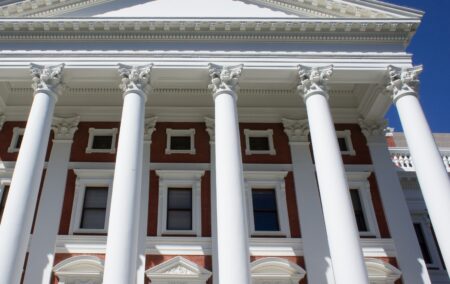Robust debate on the best policies to take South Africa forward has been scant – and the risk we face is ending up as ‘just another failed African state’.
In theory at least, elections are an opportunity for the country to reflect on the issues that determine its future, and for people to express their preferences about them.
Next week’s polls have been put forward as one of the most – if not the most – important election since 1994. And given the scale and immediacy of the multiple crises that the country faces, South Africa should be alive with debate about the policy options for addressing them.
Yet, it is an unfortunate reality that policy often plays a relatively limited role in the country’s public politics. True enough, parties have stumped their policy choices in their manifestos, and from the hustings from time to time. But detail has been sketchy, and debate – in the sense of a robust exchange of perspectives, an intellectual challenge to one’s opponents as to the best path for the country to take – has been scant.
Policy, to the extent it features in our electoral politics, is an accoutrement for political brands and their aspirations for power. In their appeals to the electorate, parties and candidates hinge their messages on what they intend to provide. ‘Delivery’ is the watchword – jobs, grants, land, education and so on. Or the affirmation of identity. Ultimately, it’s a crude, short-term game, played in the promise and hope of rewards.
This is a regrettable failing. One group that appears to have spotted the danger is Business Leadership South Africa (BLSA). In widely publicised comments, it called out the policy ‘paralysis’ that has dogged the country. Little enough has been done to deal with the crisis afflicting the state-owned enterprises – an emergency bail-out was granted to Eskom last month – but more concerningly, there is a reckless disregard for consequence in the pronouncements of some of the country’s most senior politicians.
Economic observers, said BLSA Chief Operating Officer Busisiwe Mavuso, were watching developments. Post-election, their assessment of the state and direction of the country are unlikely to be ‘lenient’. Moody’s, the only ratings agency which affords South Africa an investment grade rating, would take a hard look at the direction the country was headed in and make adjustments accordingly. The consequences of a downgrade would be unhappy.
‘Government’, said Mavuso, ‘needs to stop playing in a sea of mediocrity and take a stance on non-populist policies.’
The dangers are apparent; the lurch towards Expropriation without Compensation as an ersatz-solution to the land reform malaise; the proposed nationalisation of the Reserve Bank; the mess at the country’s state-owned enterprises; and intrusions into intellectual property via the Competition Amendment Bill.
Each of these represents a policy position, not merely a slogan or vague signifier of ‘delivery’. They are part of the complex of decisions and choices that an incumbent government will make. And they will have stark implications for the fate of the country. Each of them, after all, denotes a danger to South Africa’s economic prospects.
If the electoral process is to be a truly meaningful one, especially during fraught times like these, it would be important that policy be placed front and centre for consideration. Equally, it would be incumbent on the country’s voters to understand and analyse what is on offer – and what it will mean for them and the country at large.
To our great peril, neither the country’s political class, nor its voting public, seem particularly inclined to do so. (Let us not ascribe this solely to the ruling party – this author recently attended a public meeting, addressed by a leading opposition Parliamentarian, who discounted the importance of policy, and of explaining it to the public. ‘We’re more interested in what we do,’ he told the audience.)
This is something we may come to regret. This election comes at a precarious juncture for the country. Says Mavuso again: ‘I don’t know if the ANC realises that the chance we have after 8 May is not just another chance – and that it is the final chance. If we don’t do things right for this country, then, unfortunately, we are just going to be another failed African state.’
There is simply no substitute for understanding and reflecting on the prospective policies that will determine the future. We ignore them at our peril.
Terence Corrigan is Project Manager at the IRR.
If you like what you have just read, become a Friend of the IRR if you aren’t already one by SMSing your name to 32823 or clicking here. Each SMS costs R1.’ Terms & Conditions Apply.

